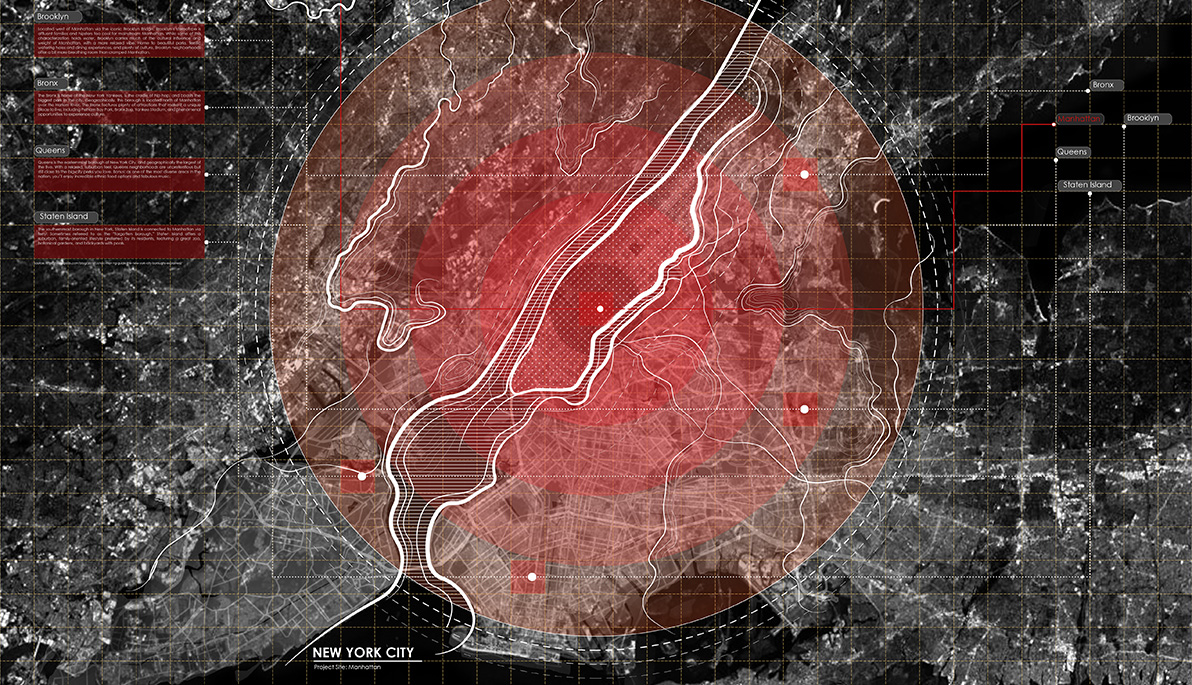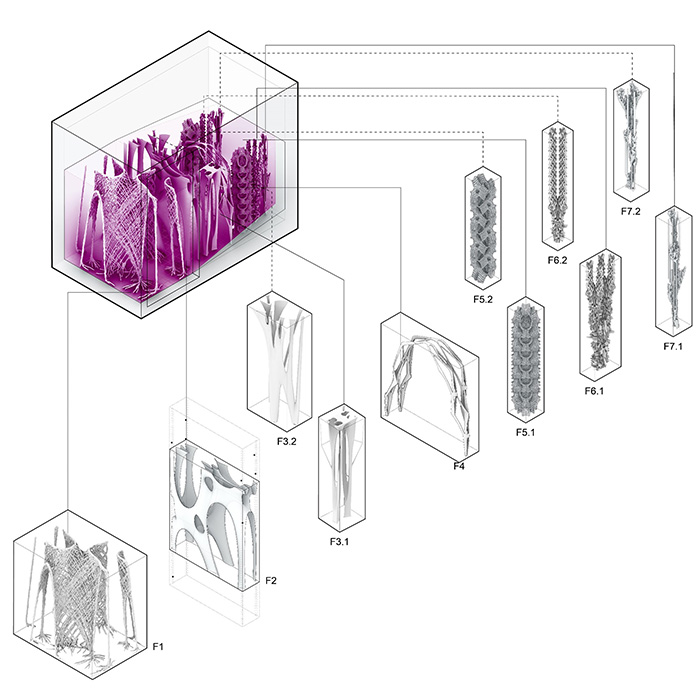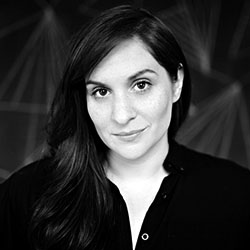
Architecture Students and Faculty Make a Grand Showing at Venice Biennale
June 10, 2021
Pictured: Master’s candidate Jay Patel’s project “Assessing the applicability of Kevin Lynch’s framework of ‘The Image of the city’ in the case of New York City,” is focused on the perception of “an image” of a city, which is based on Lynch’s (an urban planner) idea of how individuals make mental maps of urban spaces.
After more than a year of crisis and change, the 2021 Venice Biennale Architecture has prompted designers, architects, researchers, and industry professionals to ask themselves, “How will we live together?” With ambitious answers to this important question, a delegation of School of Architecture and Design faculty and students will be among the 112 participants from 46 countries at this prestigious event, which opened May 22 and runs through November 21, 2021.
“This is the first time that the School of Architecture and Design has such a large presence, with multiple exhibitions, installations, and panels, involving the entire school,” says Dean Maria Perbellini, M.Arch., AAIA, OAI, who is overseeing New York Tech’s participation at the event. Faculty and student contributions on the theme Resilient Communities will be part of the Italian Pavilion, located at the Tese delle Vergini in the Arsenale, one of several venues at the 17th International Architecture Exhibition. The pavilion is sponsored and promoted by the Italian Ministry of Culture, General Direction for Contemporary Creativity, and curated by Alessandro Melis, the new School of Architecture and Design IDC Foundation Endowed Chair.
“Proposing a shared approach to reimagine our future, the Architecture Venice Biennale is the perfect venue to showcase the ambitious design agenda of the School of Architecture and Design at New York Tech,” says Perbellini. “Design innovation plays a crucial role in addressing integrated strategies, able to not only respond to environmental, health, economic, and social crises, but most of all, to anticipate them.”
Originally scheduled to take place in 2020, the Architecture Venice Biennale was delayed a year due to the COVID-19 pandemic. “It was incredible to see the swift transformation in the approach of the class,” says Ari Begun (B.Arch. ’20), whose work is showcased at the event. “The question wasn’t if we would be doing the installation, rather how. By staying focused on the same goals, we were able to reimagine our purely physical installation. The lesson for me was life is not about what happens to you, it’s about what you do with what happens to you.”
According to Perbellini, “Postponing the opening for one year allowed participants to reflect deeply on the challenges of this unprecedented time and translate experiences and design ideas with empathy and humanity.” Perbellini is supervising New York Tech’s contribution to the Biennale and serves as an invited member of the Italian Pavilion Advisory Board, one of the creative directors of the Virtual Italian Pavilion Section, and as a curator of the section Architecture as Caregiver.
Within the section Architecture as Caregiver, the work of New York Tech students and faculty can be found on display in the exhibition Correlated Resiliencies. Through video installations and interviews, the exhibition showcases work produced by students and faculty from 2017 to 2021 within several studios, exchange workshops, traveling programs, and local and international community design collaborations. Digital Design and Performative Technologies, Urban Ecology and Sustainable Growth, and Community Design and Resiliency are the main topics explored through a variety of work collected across several academic levels.
Another project, represented in an exhibition, a sight-specific installation, and a round table discussion focuses on Informed Interscalar Fluidity. This collection of works by School of Architecture and Design thesis students is part of the Time Space Existence exhibition presented by the European Cultural Centre at Palazzo Bembo. “The relevance of the installation is to work through technological innovation in architecture through artificial intelligence, big data, and virtual reality, addressing the ecological crisis critically,” says Associate Professor and Director of the M.S. Programs Pablo Lorenzo-Eiroa, M.Arch. II, who curated the installation. “The challenge is not only to design an immersive interactive space environment that addresses the environmental conditions of the site and space but also to think of architecture as meta-architecture, designing systems that do architecture instead of designing architecture spaces directly.”

Informed Interscalar Fluidity is a collection of works by School of Architecture and Design thesis students. This exhibition and installation is part of the Time Space Existence exhibition curated by Associate Professor Marcella Del Signore and visiting Assistant Professor Sergio Elizondo. The site-specific installation is curated by Associate Professor Pablo Lorenzo-Eiroa.
For the installation, students developed several types of simulations using computational thinking, designing across a range of scales and systems. The team of students developed an interactive, immersive space environment, using animation projection as well as virtual reality. The installation will continue to be augmented throughout the summer, with the addition of robotically fabricated physical surfaces and physical robotic interactive features, such as light-sensing movement interacting with movement and sound. “The project expands computational thinking across disciplines and scales from the material, to the building, to the urban scale,” says Marcella Del Signore, M.Arch., associate professor and director of the M.S. in architecture, urban, and regional design program, and a moderator for the round-table discussion. Del Signore is also the curator of the exhibition Informed Interscalar Fluidity with visiting Assistant Professor Sergio Elizondo.
“Our class overcame many challenges presented to us while participating in the Venice Biennale,” says Brianna Lopez (B.Arch. ’20), one of the student presenters. “It was exciting to discover new ways to think about architecture, how people can experience space, and utilize new technologies for our own installation.”
As part of an open roundtable and workshop, entitled “Design + Health, The open city paradigm,” Professor Christian Pongratz, M.Arch., co-curated a discussion of how future design studies might employ a cross-disciplinary approach that integrates three important urban systems: health, food, and dwelling, allowing for more resilience and capacity building.
“A holistic understanding of the individual or patient affords in-depth learning and empathy-building that goes far beyond what can be built through pure clinical data,” says Pongratz. “My recommendation is to promote more radical collaboration among schools and colleges under the two umbrella research themes, open city, and design and health, as well as facilitating an organizational learning structure more appropriate to the requirements of future dynamic workplaces.”
“COVID, climate change, questions of social justice, the gender gap, and a call for more inclusion are all interlocking issues we are facing simultaneously,” says Perbellini. The New York Tech community has already demonstrated a commitment to addressing these themes through studio projects, virtual conversations with invited guests, and dedicated symposia and panels. These challenges are also core themes of New York Tech’s specialized graduate master’s degrees, placing the School of Architecture and Design at the forefront of the discourse. It is a critical turning point for practice and education.”
Projects by the School of Architecture and Design on display include:
- Section “Architecture as Caregiver” curated by Dean Maria Perbellini, includes the exhibition “Correlated Resiliencies” with student and faculty works, Arsenale, Italian Pavilion.
- Installation “AÈRIO” designed by Marcella Del Signore, in the Section “Architecture as Caregiver,” Arsenale, Italian Pavilion.
- Exhibition “Correlated Crises” and a series of New York Tech’s virtual events with the creative direction of Dean Maria Perbellini in the Virtual Italian Pavilion, Section curated by Tom Kovac and Alessandro Melis.
- Panel ”Expanding Critical Computational Thinking” curated by Marcella Del Signore and Pablo Lorenzo-Eiroa at the European Cultural Centre, Palazzo Bembo in Venice.
- “Informed Interscalar Fluidity” includes an exhibition curated by Marcella Del Signore with Sergio Elizondo and a site-specific installation curated by Pablo Lorenzo-Eiroa, in “Time-Space-Existence” at the European Cultural Centre, Palazzo Bembo in Venice.
- Exhibition of selected works from students and faculty curated by Marcella del Signore and Giovanni Santamaria, in Spazio Peccioli, Arsenale, Italian Pavilion.
- Panel “Design + Health, The Open City Paradigm,” curated by Christian Pongratz and Chris Lawer, UMIO, in Spazio Peccioli, Arsenale, Italian Pavilion.
- Installation “CRISPR-Locus,” designed by Christian Pongratz, Maria Perbellini (PPA) with Dustin White, Giardino delle Vergini, Arsenale, Italian Pavilion (exterior).
- Exhibition “Future School” curated by Hae-Won Shin, participation of Dong-Sei Kim, Giardini, Korean Pavilion.
A Team Effort
Organizing the School of Architecture and Design’s participation in the Venice Architecture Biennale 2021 was a team effort. The following individuals helped with the coordination of tasks and selection of works. “They have been instrumental to our successful presence,” said Dean Maria Perbellini, M.Arch. “We have been working together as a team and I am so grateful to each of them, including all the faculty and students who are showcased.”
- Anthony Caradonna, associate dean
- Giovanni Santamaria, Ph.D., associate professor and chair of architecture
- Marcella Del Signore, M.Arch., associate professor and director of M.S. Urban and Regional Design
- Pablo Lorenzo-Eiroa, M.Arch. II, associate professor and director of M.S. programs
- Christian Pongratz, M.Arch., professor of architecture
- Dong-sei Kim, M.Des., assistant professor of architecture
- Dustin White, director of digital technologies and fabrication
- School of Architecture and Design faculty and staff
Video Production:
- Rozina Vavetsi, M.Sc., associate professor and chair of digital art and design
- Michael Hosenfeld, associate professor of digital art and design
- Anila Jaho, visiting assistant professor of digital art and design

By Alix Sobler
More Features

An Alumnus’ Commitment to the Environment
As an energy management graduate from New York Tech’s Vancouver campus, Jasdeep Gulati (M.S. ’22) is highly invested in educating people about environmental and climate sustainability.

Vancouver Faculty Win University-Sponsored Research Awards in New Program
The new Global Impact Research Grant (GIRG) program has been developed to keep Vancouver-based faculty connected to faculty and research projects being conducted on the university’s New York campuses.

Studying Climate Change One Degree at a Time
Junhua Qu (M.S. ’24) began her collegiate journey in Beijing. But, her interest in climate change took her to New York Tech’s Vancouver campus to study energy management.